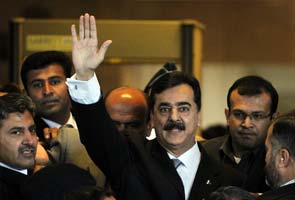Shares across Asia rose on Monday as pro-bailout parties were seen ahead to form a coalition government with the slimmest of majorities. Major indices in Hong Kong, Taiwan, Korea and Japan gained 1.5 per cent to 2 per cent.
Fears of an imminent Greek exit from Europe's joint currency receded Sunday after the conservative New Democracy party came first in a critical election and pro-bailout parties won enough seats to form a joint government.
As central banks stood ready to intervene in case of financial turmoil, Greece held its second national election in six weeks after an inconclusive ballot on May 6 and the subsequent collapse of coalition talks.
With one party advocating ripping up Greece's multibillion-euro bailout deal, Sunday's election was seen as a vote on whether Greece should stay in the 17-nation group sharing the euro currency. A Greek exit would have had potentially catastrophic consequences for other ailing
European nations, the United States and the entire global economy.
Near complete results showed New Democracy coming first with 29.6 percent of the vote and 129 of the 300 seats in Parliament. The radical left anti-bailout Syriza party had 26.9 percent and 71 seats and the pro-bailout Socialist PASOK party came in third with 12.3 percent of the vote and 33 seats. The extremist far-right Golden Dawn party had steady support, getting 6.9 percent of the vote and 18 seats.
Sunday's results "will probably ease fears of an imminent Greek euro exit," said Martin Koehring of the Economist Intelligence Unit. "There will probably be a relief rally tomorrow in the financial markets. But the key question is how quickly can a government be formed?"
Stock analysts, however, warned that any bounce for financial markets could be short-lived.
"Treat knee-jerk market rallies with caution," Neil MacKinnon, a global macro strategist at VTB Capital, advised clients, saying there was still too many questions about Europe's debt crisis to celebrate the Greek vote.
Because of a 50-seat bonus given to the party which comes in first, that result would give New Democracy and PASOK a projected 159 seats in the 300-seat parliament, in an alliance committed to a 130 billion euro EU/IMF bailout keeping the country from bankruptcy.
SYRIZA, led by a 37-year-old former communist, has vowed to tear up the punishing terms of the deal, potentially sending the country crashing out of Europe's single currency and rocking the euro to its core.
Earlier polls had put New Democracy and SYRIZA virtually level. All the figures are subject to a margin of error which leaves a degree of uncertainty.
Greece's lenders say a new government must accept the conditions of a 130-billion-euro bailout agreed in March or funds will be cut off, driving Athens into bankruptcy.
A Greek euro exit has the potential to unleash shocks that could even break up Europe's single currency and plunge the global economy into chaos.
World leaders gathering at a G20 summit starting in Mexico on Monday will be watching with alarm.
Central banks from major economies stand ready to take steps, including coordinated action, to stabilise markets if the election triggers a financial storm or public panic, G20 sources told Reuters last week.
"If we were in the United States, we would say it's too close to call and decline to publish a forecast," said Costas Panagopoulos of pollster Alco.
All the main parties say they will keep Greece in the single currency, but SYRIZA leader Alexis Tsipras believes he can renegotiate the deal. He is betting that European leaders cannot afford the financial market turmoil that could be unleashed by cutting a member of the euro zone loose.
Tsipras, a 37-year old former communist student radical, has shot from obscurity to global celebrity in a matter of weeks.
On the right, establishment heir and New Democracy leader Antonis Samaras says rejection of the EU/IMF bailout would mean a return to the drachma and even greater calamity, although he too wants to ease some aspects of the package.
Many believe Greece cannot hope to deliver an austerity programme designed to radically cut debt given it will drive it ever deeper into recession. But its euro zone peers are prepared only to tinker with the deal and then only with a government firmly committed to the bailout.
"There can't be substantial changes to the agreements but I can imagine that we would talk about the time axes once again, given that in reality there was political standstill in Greece because of the elections, which the normal citizens shouldn't have to suffer from," German Foreign Minister Guido Westerwelle said on German TV station ARD.
"But there is no way out of the reforms. Greece must stick to what has been agreed," he said.
Samaras has called for an extra two years to make the cuts demanded of his country.
Opinion polls show Greeks, weary and disillusioned after five years of deep recession, overwhelmingly favour remaining in the euro, but there is bitter anger over repeated rounds of tax hikes, slashed spending and sharp cuts in wages and pensions.
Many voters are also furious with New Democracy and the other traditional ruling party, PASOK, blaming them for decades of corruption and waste which have left them with a ruined economy and one of the heaviest debt burdens in the world.
"I voted for the bailout because these are the terms that will keep us in Europe," said 66-year-old English teacher Koula Louizopoulou after casting her ballot in Athens, hinting that she had chosen New Democracy.
"It's the first time I feel depressed after voting, knowing that I voted again for those who created the problem, but we don't have another choice," she added.


